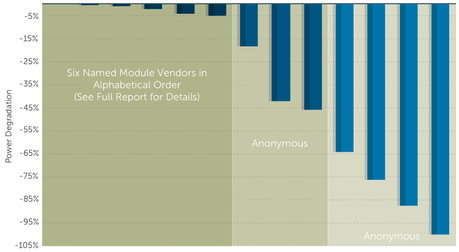 Photovoltaic panels at Des Lacs National Wildlife Refuge. (Credit: USFWS)
Photovoltaic panels at Des Lacs National Wildlife Refuge. (Credit: USFWS)A new report, the PV Module Reliability Scorecard 2014, by GTM Research and PV Evolution Labs, now DNV GL, found that PV manufacturer’s solar panels performed relatively well across all metrics.
The scorecard helps show that PV modules sold today have a high degree of reliability and aren’t likely to fail. However, “module reliability is not necessarily a consistent quality,” wrote report author, GTM Research solar analyst Jade Jones. “Of all vendors analyzed, only one company consistently ranked within the Performance Leaders group for all test regimens.” GTM did not publicly disclose which of the companies delivered the most consistent modules. The report, intended for investors and developers, carries a hefty price tag starting at $2,995.
SEE ALSO: First Solar Announces New Record For CdTe Solar Cell Efficiency

Potential Induced Degradation on Negatively Biased Module (PID-) Test Results. (Source: GTM Research). Note: Company names included in full report
Jenya Meydbray, head of module and inverter testing at DNV GL explained why some modules may not perform as the makers anticipate. “While all modules met the regulatory UL requirements, long-term, real-world performance is not simply pass/fail. More robust module designs were clearly identified,” she said.
Still, that the majority of manufacturers covered in the study, including Jinko Solar, Kyocera, LDK Solar, ReneSola, Suntech, Trina Solar, and Yingli Solar, among others, showed consistent reliability speaks volumes to the improvements made to solar, particularly as solar power has grown enormously over the past few years. After all, “Nearly two-thirds of the cumulative 130 gigawatts of installed solar photovoltaic modules in the world were produced in the last three years, a period marked by record module price reductions,” wrote GTM’s Mike Munsell in a post about the scorecard.
“During this time, module manufacturers’ aggressive cost reductions have raised questions around long-term PV performance and module quality. At the same time, PV project developers are building projects in emerging markets and subjecting PV modules to more extreme and diverse environmental conditions,” Munsell said.
The scorecard is based on the performance of PV modules subjected to DNV GL’s highly accelerated life testing (HALT). The tests were designed to mimic real-world stresses to identify what quality issues and potential failures. Such tests included extended thermal cycling, damp heat, humidity-freeze, dynamic mechanical load, and potential induced degradation for positively and negatively biased modules, according to the scorecard.
“The PV Module Reliability Scorecard is a unique module quality comparison resource that helps the PV industry identify long-term performance leaders on an apples-to-apples basis with their peers,” explained MJ Shiao, GTM Research’s Director of Solar Research. “While it may not replace in-depth bill-of-materials and manufacturing-process studies, the Scorecard is an invaluable asset in quality-backed procurement strategies for module buyers and project investors of all sizes.”
This article was originally posted on SolarReviews by Chris Meehan.

